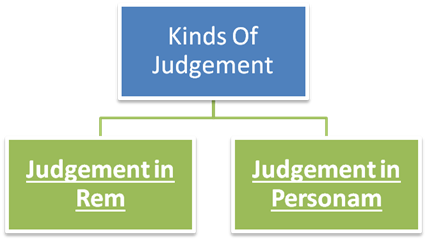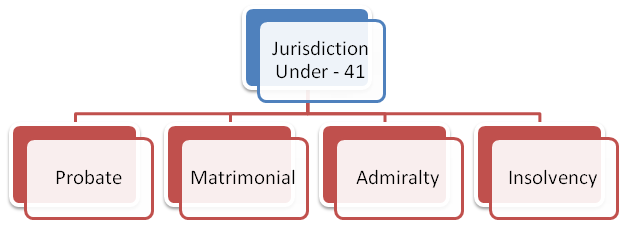Section 40 to Section 44 of the Indian Evidence Act, 1872 lay down the provisions relating to judgements of Court of Justice, when relevant
The object of the provision of this chapter is to avoid multiplicity of the suit and to save precious time of the Court. There should be end of litigation in the interest of justice and republic
S.11 of C.P.C deals with Doctrine of res Judicata which signifies that when a matter of fact has been finally and conclusively resolved by a competent court. the same matter cannot be re-litigated once again.
Interest Reipublicae Ut Sit Finis Litium
Firstly we need to understand the actual meaning of judgement under the code of civil procedure, 1908. Judgement is defined under Section 2(9) of the Civil Procedural Code as the statement given by the judge on the grounds of a decree or order.
Judgement can also defined as a decision which is given by the judges in a court regarding the rights, duties and liabilities of an individual.

Judgement in Rem :
Judgements affecting the legal status of some subject matters, persons or things are called ‘Judgments in rem’ . It will not only remain between the two parties but also be applicable to the entire world. e.g. Divorce Court Judgement, grant of probate or administration etc. Such judgements are conclusive evidence against all the persons whether parties to it or not.
Judgement in Personam :
Judgements in personam are all the ordinary judgements not affecting the status of any subject matter, any person or anything. In such judgements, the rights of the parties to the suit or proceedings are determined.
| JUDGEMENT IN REM | JUDGEMENT IN PERSONAM |
| It is adjudication pronounced upon the status of a person or a thing by a competent court to the world generally. | It is the ordinary judgements not affecting the status of any subject matter, any person or anything. |
| Judgement of a court in exercise of probate, matrimonial or insolvency jurisdiction confirming or take away any legal character are judgements in rem. | The judgements of civil courts are judgement in personam. |
| It is binding on all persons, whether they are parties to those proceedings or not. | It is binding on the parties to the suit only. |
’Relevancy of judgement,” it means that every judgement is based upon the facts of each particular case. If we understand it in a simple way, it says that each and every case has its own importance. The judgement of each case is based upon the subject matter and it is not necessary that the judgment of one case is interrelated with another case.
A civil judgement is not relevant to a criminal trial though arising out of the same fact. A judgement in a civil case for defamation is not relevant to criminal prosecution. The previous judgment is not relevant to the subsequent case. More importance is given to the facts of the cases and on the basis of which judgement is given.
Section – 40 of Evidence Act
Previous judgments relevant to bar a second suit or trial
Section 40 permits evidence of the previous judgement, order or decree which by law prevents any Court from taking cognizance Of a Suit or holding a trial. It means that the previous judgement becomes relevant to bar the subsequent judgement.
Section 11 of the Civil Procedure Code embodies the rule of Res Judicata which bars or restrain the repetition of suit or litigation of the same issue.
The basic objective of incorporating this principle is to prevent multiplicity of suits and interminable disputes between the litigants. Once there has been judgment, order or decree about fact and laws no subsequent proceeding would be started. The doctrine of res judicata rests upon the maxim “nemo debet bis vexari pro una et edem cause” (No man ought to be tried twice for the same cause of action).
Sec. 40 deals with the principle of res judicata in civil cases or autre fois acquit or autre fois convict, in criminal cases
Similarly, Article 20(2) of Constitution of India and Section 300 of CRPC provides for the principle of “auterfois convict” or Double jeopardy which means that person must not be punished twice for the offence.
Section – 41 of Evidence Act
Relevancy of certain judgments in probate, etc. jurisdiction
Section 41 deals with what is known as judgement in rem, which not only bind the parties at the representatives to it, but also are binding as against the whole world.

For a judgement to be binding and conclusive proof under section 41 the following conditions have to be satisfied
- The judgement must be a final judgement.
- The court delivering the judgement must be competent.
- The judgement must have been delivered by the court in the exercise of Probate, sMatrimonial, Admiralty or Insolvency jurisdiction.
- The judgement must confer on or take away from any person any legal character or declare that any person is entitled to such legal character or declared that any person is entitled to any specific thing absolutely.
- The judgment is conclusive proof of matters (Probate, Matrimonial, Admiralty or Insolvency jurisdiction).
Section – 42 of Evidence Act
Relevancy and effect of judgments, orders or decrees, other than those mentioned in section 41
According to Section 42, any Judgments, orders, or decrees other than those mentioned in Section 41 are relevant judgment.
If they are related to matters of public nature relevant to the inquiry;
Such judgment, order, or proclamation does not have conclusive proof of that which they state.
If a judgment comes under sec. 41, it is relevant as well as conclusive even against a third party;
If it comes under sec. 42, it is relevant as against a third party;
All other judgments are relevant as between the parties or their representatives only, under sec. 40.”
According to Section 42 the matters of public nature means matters affecting entire population or at least a large section of the population. “It should be remembered that judgments relating to matters of public nature relevant under section 42 neither work as res judicata nor they are conclusive as judgment-in-rem.
” They can be used as corroborating evidences. Such evidence may not be between the same parties, but they are related only to the matters of public nature relevant to the inquiry
Section – 43 of Evidence Act
Judgment, etc., other than those mentioned in sections 40 to 42, when relevant
Section 43 provides that if judgment is not relevant under sections 40, 41 or 42 it will not be relevant unless the judgment itself is a fact-in-issue or is a relevant under some other provisions of the Act.
This section expressly contemplates cases in which a judgment itself is fact-in-issue or is relevant fact, being admissible except Sections 40,41 and 42.
The purpose of this Section is to prohibit the judgements from being given in evidence which are neither enter parts nor a judgement in rem nor a judgement relating to matters of public nature.
Section – 44 of Evidence Act
Fraud or collusion in obtaining judgment, or incompetency of Court, may be proved
The general rule is, a judgement of a competent court shall be binding on the parties operating as Res Judicata in subsequent proceedings between the same parties. Section 44 contains exception to this rule. The section deals with Fraud or collusion in obtaining judgment, or incompetence of Court, may be proved. According to Section 44, a judgement is liable to be annulled /impeached on the ground of –
- of want of jurisdiction;
- fraud; and
- collusion
Section 44 lays down that a party to a suit or other proceeding may show that a judgment, order or decree:
Which is relevant under section 40 that is, which would, as a judgment inter-parties operates as res-judicata;
Which is relevant under section 41 that is, which is relevant as a judgment-in-rem;
Which is relevant under section 42 that is, which is evidence as a judgment relating to public matter;
Which is proved by the adverse party; that it was passed by a court,
which had no jurisdiction to pass it or
it was obtained by fraud or collusion.








No comment